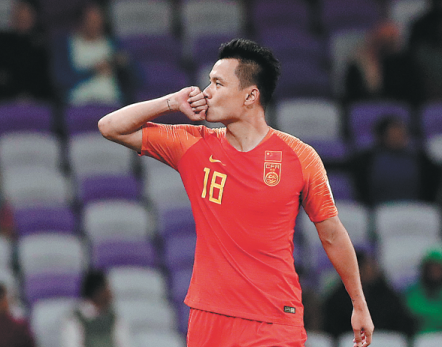Tactical learning gap a bridge too far, laments Gao
By Shi Futian (China Daily) Updated: 2020-01-08 00:00Veteran China international Gao Lin has likened the national team's players to "high school students" who were unable to comprehend the tactics of their "college professor" ex-coach, Marcello Lippi.
Former World Cup winner Lippi resigned from the job for a second time in November following a disappointing start to China's 2022 World Cup qualifying campaign.
The Italian and the players have come in for heavy criticism from fans, but in an interview with Tencent Sports this week, Gao attempted to deflect blame away from his former coach.
"Lippi can be considered a world-renowned professor and some sort of leader in the area. He has many strategies and good ideas," said Gao.
"But for Chinese players, we are still like high school students. We might not fully understand the coach's tactics or we are not capable of carrying out his tactical plans 100 percent.
"We must acknowledge that if players in the top-level European leagues are graduates or postgraduate students, we are not at that level yet... We have to face the gap directly and try our best to improve."
Lippi delivered little to cheer about in his first term in charge, failing to steer the national team to the 2018 World Cup finals before resigning last January following more lackluster performances at the Asian Cup.
The 71-year-old was persuaded back as head coach in May, but submitted his resignation again in November, following a 2-1 defeat to Syria that has badly damaged China's chances of reaching the 2022 Qatar World Cup.
Last weekend, former China and Everton midfielder Li Tie was appointed as Lippi's successor.
Gao, though, has cautioned that changes to the coaching staff can only go so far in turning around China's fortunes on the pitch.
"Yes we can always have another new coach, but what actually matters is what kind of players the new coach can choose from," said Gao.
"When a head coach has hundreds of high-level players to choose from, it's easy for him to have great results. But if there's just dozens to choose from, no one can make a real difference. Not even Lippi."
At 33, Gao has started to think about life after his playing days end, with the Guangzhou Evergrande striker hopeful of pursuing a career in youth coaching.
"If I can coach a group of 8-and 9-year-old kids and be with them till they are 18 years old, and then watch them achieve big things in their professional career, I believe that would be the proudest achievement in my life," said Gao, who won his first Chinese cap in 2005.
Talent pool
On Monday, the Chinese Football Association revealed its latest efforts to boost youth soccer. The governing body has established a talent pool of 64 players with the aim of analyzing the technical characteristics of Chinese players at different ages.
The players have been mainly selected from Chinese Super League clubs. The CFA said an additional eight young players will be "closely observed and assessed", while a talent pool of young Chinese playing abroad is also in the pipeline.
"The CFA is trying to get an idea of the actual condition of Chinese soccer players and their technical characteristics," read the CFA announcement.
"We will track the development of Chinese soccer players over longer terms to devise a better development process."
Chris Van Puyvelde, the CFA's technical director, believes Chinese soccer needs to inspire the next generation of coaches and players.
"I believe China has a big future in football, but it will take time," said the Belgian last weekend following Li's appointment as head coach.
"Go step by step and you will see the results. China has a big future, I'm sure of it. Otherwise, I would not be here."
As well as youth development, the CFA has begun to recruit naturalized players in a bid to improve the national squad.
So far, the additions of Evergrande's Brazil-born forward Ai Kesen (aka Elkeson) and Beijing Guo'an's England-born utility player Li Ke (aka Nico Yennaris) have not quite had the impact many had hoped for.
However, Gao has urged fans to get behind the team's new foreign-born recruits.
"When the naturalized players join us, we should just consider them as one of our own. And we should not always think too much about whether he's naturalized or not," said Gao.
"They have already become Chinese and they are our compatriots. There's no difference."
Van Puyvelde concurred, saying: "Naturalized or domestics, we are talking about the same players who want to win for the team. Players are the same."

- 'Cooperation is complementary'
- Worldwide manhunt nets 50th fugitive
- China-Japan meet seeks cooperation
- Agency ensuring natural gas supply
- Global manhunt sees China catch its 50th fugitive
- Call for 'Red Boat Spirit' a noble goal, official says
- China 'open to world' of foreign talent
- Free trade studies agreed on as Li meets with Canadian PM Trudeau
- Emojis on austerity rules from top anti-graft authority go viral
- Xi: All aboard internet express











